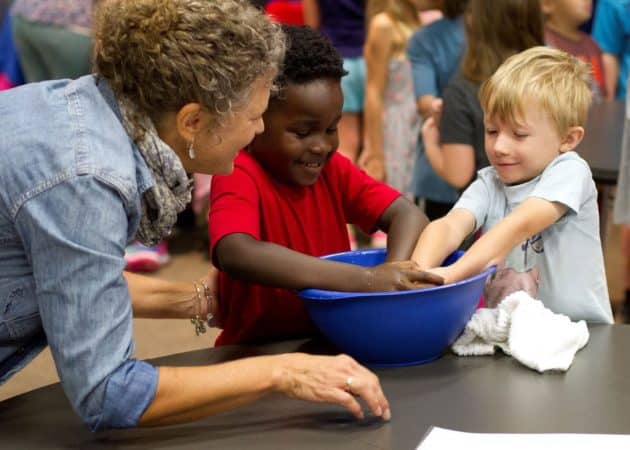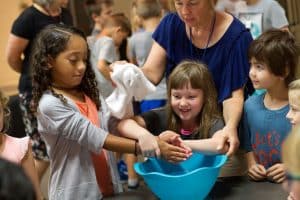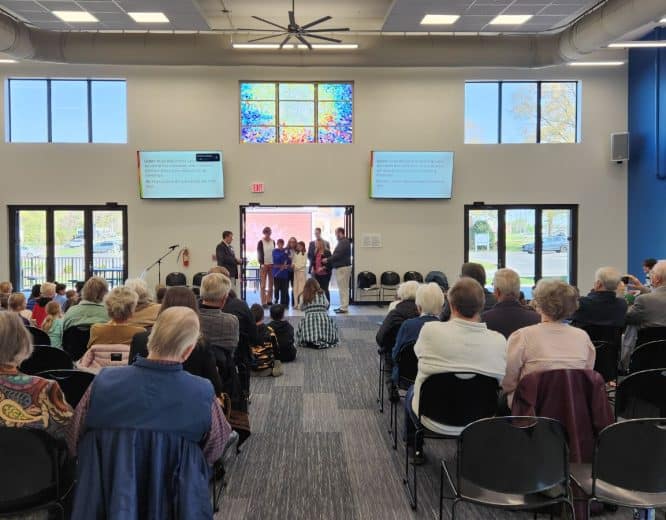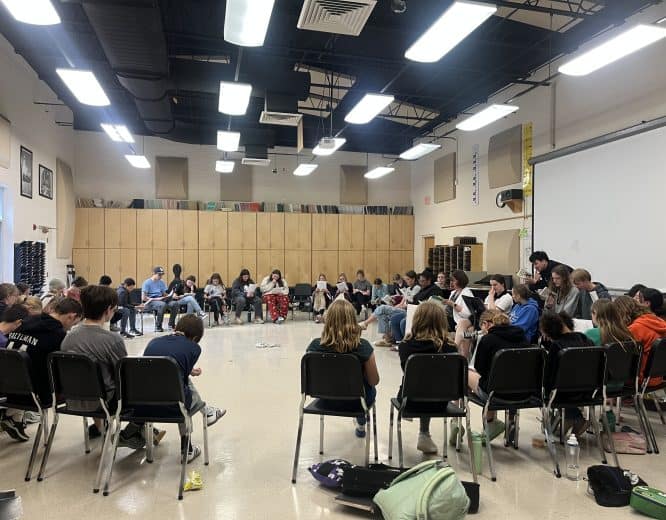Elementary Students Sign Pledge of Nonviolence, Wash Others’ Hands

 Eastern Mennonite Elementary students took part in an annual tradition this week, with each student adding their name to their classroom’s pledge of nonviolence poster, and then washing one another’s hands.
Eastern Mennonite Elementary students took part in an annual tradition this week, with each student adding their name to their classroom’s pledge of nonviolence poster, and then washing one another’s hands.
“We have this tradition as a way of promising we will care for each other and try our best,” explained Lynette Good ‘84 Mast, peacebuilding teacher and kindergarten assistant. “We won’t always get it right, but when we hurt each other, we will talk about it.”
This is the 14th year the school has used the pledge at the beginning of the year, according to Mast. The pledge highlights seven tenets (full listing below): To respect self and others; to communicate better; to listen; to forgive; to respect nature; to play creatively; and to be courageous.
The pledge signing and hand washing took place during the school’s weekly K-5 community building “gathering time.” Older elementary students reviewed the pledge’s seven tenets for new and younger students, demonstrating American Sign Language for each one.
Mast shared how Jesus washed his disciples’ feet — as told in the book of John, chapter 13 — to show care and an attitude of service. Washing each others’ hands reminded students to show care and service to each other.
 The pledge “gives us a framework that teachers, students and administrators use all year to ‘hang a hat on,’” says Mast. For example, she notes, when there is an incident in the playground, “we can refer to our intention to respect each other as a conversation starter.”
The pledge “gives us a framework that teachers, students and administrators use all year to ‘hang a hat on,’” says Mast. For example, she notes, when there is an incident in the playground, “we can refer to our intention to respect each other as a conversation starter.”
“Listening to a different perspective, taking responsibility for our mistakes, talking about our differences, and standing up for those who have been wronged, are important for our students to practice,” says Maria Bender ’81 Archer, K-8 principal. “Not only does this make good sense for our society, but it is also how we live as people of faith. Jesus teaches us about how we should live and be together, and at EMS, we take his words and actions seriously.”
The tenets are:
- To Respect Self and Others — To respect ourselves, to affirm others and to avoid uncaring criticism, hateful words, physical attacks and self-destructive behavior.
- To Communicate Better — To share our feelings honestly, to look for safe ways to express our anger, and to work at solving problems peacefully.
- To Listen — To listen carefully to one another, especially those who disagree with us, and to consider others’ feelings and needs rather than insist on having our own way.
- To Forgive — To apologize and make amends when we have hurt another, to forgive others, and to keep from holding grudges.
- To Respect Nature — To treat the environment and all living things, including our pets, with respect and care.
- To Play Creatively — To select activities and toys that support our school’s values and to avoid activities that make violence look exciting, funny or acceptable.
- To Be Courageous — To challenge violence in all its forms whenever we encounter it, whether at home, at school, or in the community, and to stand with others who are treated unfairly.
“This is our pledge. These are our goals,” closes the pledge. “Eliminating violence, one school at a time, starting with our own.”
The pledge — available in various forms for churches, families, schools and other organizations — was developed by The Institute for Peace and Justice in St. Louis, Missouri.
Photos by Andrew Gascho



